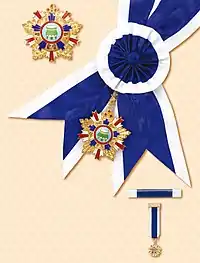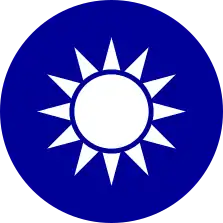Order of the Sacred Tripod
The Order of the Sacred Tripod (寶鼎勳章), also referred to as the Order of the Precious Tripod or Pao Ting, is a military award of the Republic of China. It was created on 15 May 1929 for significant contributions to national security. The order is organized into nine grades. The central design of the order's insignia is an image of a tripod surrounded by golden rays. The symbolism of this is that as the tripod is considered a national treasure, so too is the recipient of the order.[1]
| Order of the Sacred Tripod | |
|---|---|
 Order of Sacred Tripod with Special Grand Cordon | |
| Awarded for | Significant contributions to national security |
| Country | |
| Presented by | President of the Republic of China (Taiwan) |
| Status | Currently awarded |
| Established | 15 May 1929 |
| Precedence | |
| Next (higher) | Order of Blue Sky and White Sun |
| Next (lower) | Order of Loyalty and Valour |
Grades
The order is divided into nine grades, they are as follows:[1][2]
| Grade | Name | Grade | Ribbon |
|---|---|---|---|
| 1st | Order of the Sacred Tripod | with Special Grand Cordon[3] | |
| 2nd | with Grand Cordon[4] | ||
| 3rd | with Red Grand Cordon[4] | ||
| 4th | with Special Cravat[5] | ||
| 5th | with Cravat[5] | ||
| 6th | with Special Rosette[5] | ||
| 7th | with Rosette[5] | ||
| 8th | with Special Ribbon[5] | ||
| 9th | with Ribbon[5] |
Notable recipients
- Chiang Kai-shek
- Gao Zhihang
- Charles D. Griffin
- William G. Farrow
- Bruce K. Holloway
- Huang Wei
- Ernest King
- Thomas C. Kinkaid
- Alexander von Falkenhausen
- Douglas MacArthur
- Thomas Hinman Moorer
- Ng Yat Chung
- Chester W. Nimitz
- George H. Olmsted
- Alfred M. Pride[6]
- Qiu Qingquan
- Bhim Shamsher Jang Bahadur Rana
- Padma Shamsher Jang Bahadur Rana
- Bertram J. Rodgers
- Alexander Vandegrift
- Hoyt Vandenberg
- Yan Xishan
- Zhang Lingfu
- Heng Hsieh
References
- "Decorations of the Republic of China (Taiwan) Military Orders". Office of the President Republic of China (Taiwan). Retrieved 7 September 2014.
- Robertson, Megan (17 July 2004). "Taiwan: The Order of The Precious Tripod". Medals of the World. Retrieved 3 June 2010.
- "依依據陸海空軍勳賞條例規定之勳章-一等寶鼎勳章". Ministry of National Defense R.O.C. Retrieved 7 September 2014.
- "依據陸海空軍勳賞條例規定之勳章-二等-三等寶鼎勳章". Ministry of National Defense R.O.C. Retrieved 7 September 2014.
- "依據陸海空軍勳賞條例規定之勳章-四等-九等寶鼎勳章". Ministry of National Defense R.O.C. Retrieved 7 September 2014.
- 酬庸蒲賴德協防功績 總統昨頒贈勳章 並設晚宴款待中美首長作陪 殷格索今接任美七艦隊司令 [The President awarded medal to Pride for his effort on defense affairs, and host a dinner for Sino-American chiefs. Ingersoll succeed as Commander, 7th Fleet] (in Chinese). China Times. 14 December 1955. p. 1.
External links
- "Order of Precious Tripod". Office of the President Republic of China (Taiwan). Retrieved 7 September 2014.
- "Order of Precious Tripod". Office of the President Republic of China (Taiwan). Retrieved 7 September 2014.
- "Order of Precious Tripod". Office of the President Republic of China (Taiwan). Retrieved 7 September 2014.
This article is issued from Wikipedia. The text is licensed under Creative Commons - Attribution - Sharealike. Additional terms may apply for the media files.
